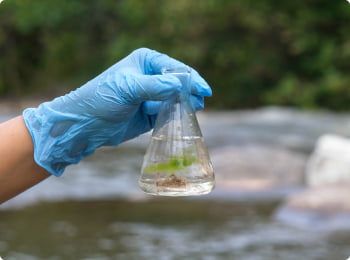Did Camp Lejeune Water Cause Birth Defects?
Possibly, yes. The toxic drinking water at the Marine Corps base may have put unborn babies at risk of Camp Lejeune birth defects and other severe health conditions.
A study was done by the Agency for Toxic Substances and Disease Registry (ATSDR) that surveyed almost 13,000 parents of children born at the base between 1968 and 1985. It found that drinking contaminated water at Camp Lejeune during the early part of pregnancy might have increased the risk of certain birth defects.
“Water pollution at the Camp Lejeune military base in North Carolina has been linked to increased risk of birth defects and childhood cancers.”
—Scientific American
Babies whose mothers were exposed to the contaminated drinking water were more likely to develop neural tube defects (NTDs) like anencephaly, which is when parts of the brain and skull are missing. They were also at higher risk for developing cancer, including childhood leukemia and non-Hodgkin’s lymphoma.
Thankfully, victims can finally pursue justice and financial aid through Camp Lejeune lawsuits, no matter how far back exposure was and even if they were denied benefits from the U.S. Department of Veterans Affairs (VA) in the past. However, you only have until August 2024 to take action.
Find out if you qualify to file a lawsuit for birth defects from Camp Lejeune water contamination with a free case review right now.
Birth Defects From Camp Lejeune Water Contamination
The true extent of birth defects linked to Camp Lejeune water contamination may never be known. Not only were sample sizes relatively small, but also medical records from long ago are hard to track down.
However, birth defects linked to Camp Lejeune water contamination may include:
- Cardiac defects
- Fetal death (stillbirth)
- Immune system disorders
- Low birth weight
- Major congenital malformations
- Neural tube birth defects (spina bifida and anencephaly)
- Oral cleft defects (cleft lip and cleft palate)
While there may not be a solid understanding of the true extent of harm done, military and civilian personnel who lived or worked at the base are all too familiar with Camp Lejeune birth defects.
“I had two children born there at the hospital; both at seven months. We were there from 1972 to 1976. Joe died less than thirty days with lung problems. My daughter was born with a hole in her stomach. … I also had another daughter born in 1979 without a spinal cord, which I believe was caused by residual effects of my wife’s contamination.”
—U.S. Marine Corps veteran
Learn more about Camp Lejeune birth defects and childhood cancers below.
Camp Lejeune Water and Neural Tube Birth Defects
ATSDR studies have linked Camp Lejeune’s toxic water to an increased risk of neural tube birth defects, like spina bifida and anencephaly.
 These conditions result from improper neural tube closure during early fetal development. The neural tube is a structure that develops while a baby is still growing in the womb. It starts as a tiny, flat ribbon of cells that rolls up into a tube by the end of the first month of pregnancy.
These conditions result from improper neural tube closure during early fetal development. The neural tube is a structure that develops while a baby is still growing in the womb. It starts as a tiny, flat ribbon of cells that rolls up into a tube by the end of the first month of pregnancy.
This tube eventually becomes the baby’s brain and spinal cord, parts of the nervous system. So, when the neural tube doesn’t form or close the right way, it can lead to conditions affecting the brain and spine because those parts don’t develop as they should.
Mothers exposed to trichloroethylene (TCE) and benzene in the base’s water supply during the early stages of pregnancy were found to be at a higher risk for neural tube defects.
Camp Lejeune Water and Childhood Cancer
ATSDR’s research also evaluated the connection between contaminated water at Camp Lejeune and multiple forms of cancer. Sadly, studies found increased risks of childhood leukemia and non-Hodgkin’s lymphoma among children exposed in utero or during their first year.
For many Camp Lejeune veterans, childhood leukemia and other cancers later in life have been among the most alarming health issues linked to the contamination.
The American Legion Magazine featured the story of a former Marine drill instructor who lost his 9-year-old daughter to leukemia in 1985.
“Nothing ever gives you comfort when you lose a child. I think that’s the worst thing that can happen to a human being … to watch them go through the hell they go through. That’s something that never leaves you.”
—Former Marine drill instructor
For decades, families and victims have advocated for research, transparency, and compensation related to the health effects of the polluted water at Camp Lejeune.
Finally, thanks to the Camp Lejeune Justice Act of 2022 (CLJA), victims of the toxic water can seek justice through legal action. This includes people born with Camp Lejeune birth defects, no matter how long ago they were born.
What Chemicals Are Linked to Camp Lejeune Birth Defects?
Chemicals called volatile organic compounds (VOCs) are linked to Camp Lejeune birth defects. For the most part, Camp Lejeune water contamination stems from an off-base dry cleaning business and an on-base fuel depot that leaked thousands of gallons of fuel into the water system over time.
VOCs were released into two of Camp Lejeune’s water supply systems — Tarawa Terrace and Hadnot Point. Further, when Holcomb Boulevard’s water treatment plant was offline, Hadnot Point’s water was used instead.
The sad reality is that toxic chemicals found in Camp Lejeune’s water could have caused birth defects, childhood conditions, and other health problems later in life.
“There’s a cemetery at Camp Lejeune called ‘Baby Heaven.’ Here, you’ll find gravestones of babies who were born with leukemia, babies born without craniums, and babies born with cleft palates and spines protruding out of their backs. They were born — and many died — with unimaginable birth defects.”
—North Carolina Health News
Camp Lejeune Chemicals and Their Effects on Unborn Babies
According to ATSDR, higher rates of birth defects are linked with in utero exposure to perchloroethylene (PCE), trichloroethylene (TCE), and benzene.
The ATSDR study suggests that different problems are linked to which chemical(s) the mother was exposed to and at what point during the pregnancy the exposure occurred.
- Benzene: Women exposed in the first trimester were more likely to have a child with NTDs
- Dichloroethylene (DCE), PCE, or vinyl chloride: Babies who were exposed in utero were more likely to develop childhood leukemia and non-Hodgkin’s lymphoma
- PCE: Pregnant women exposed during the second trimester were more likely to have a premature birth
- TCE: Women exposed during the first trimester were more likely to give birth to a baby with heart problems, immune system disorders, and NTDs
Babies Born at Camp Lejeune
People born at Camp Lejeune may not even know their illnesses were caused by the contaminated water. These victims may have faced a lifetime of chronic health problems, pain, and suffering.
For one man born on base, the harm Camp Lejeune water caused was not evident for decades. It wasn’t until age 39 that he was diagnosed with male breast cancer, considered a rare disease, especially for someone so young. His cancer went into remission, but only after a radical mastectomy and aggressive chemotherapy.
Sadly, this is not an isolated case. However, if you were born at Camp Lejeune while the water was contaminated, you may have newly available legal rights that can provide compensation for your illness.
Check to see if you could have been exposed while your mother was pregnant on the base.
| Pregnancy Range | Contamination Risk | Birth Date Range | Age Range Today (February 2024) |
|---|---|---|---|
| 1953 to 1987 | High Risk (Tarawa Terrace & Hadnot Point) | 1953 to 1988 | 37 to 71 years old |
| 1972 to 1985 | High Risk (Hadnot Point) | 1972 to 1986 | 39 to 52 years old |
| June 1978 | High Risk (Holcomb Boulevard) | June 1978 to March 1979 | 44 to 45 years old |
| April 1981 | High Risk (Holcomb Boulevard) | April 1981 to January 1982 | 42 to 44 years old |
| January 28 to February 4, 1985 | High Risk (Holcomb Boulevard) | February 1985 to October 1985 | 38 to 39 years old |
After decades of waiting, justice for Camp Lejeune birth defects and illnesses may finally be here.
If you were born at Camp Lejeune while the water was contaminated, call the Camp Lejeune Claims Center at (866) 473-4764 now. Our advocates are available 24 hours a day to talk with you about your eligibility to pursue compensation.
Pregnant Women at Camp Lejeune
Sadly, pregnant women living at Camp Lejeune are often some of the forgotten victims of this tragedy. As far back as the 1950s, women living on the base were unknowingly exposed to dangerous chemicals, which put their unborn babies at risk.
Drinking the toxic water wasn’t the only way pregnant women were exposed. They also risked exposure by washing dishes, bathing, and swimming in the contaminated water.
 In addition to Camp Lejeune birth defects, infertility and miscarriage, as well as fetal death (stillbirth), have been reported among pregnant women.
In addition to Camp Lejeune birth defects, infertility and miscarriage, as well as fetal death (stillbirth), have been reported among pregnant women.
Yet despite clear evidence linking the water on base to birth defects and other illnesses, countless women have faced repeated VA claim denials and have felt as though they were pushed aside.
A U.S. Navy wife who lived at Camp Lejeune in the 1980s lost her son to stillbirth after a complication-free pregnancy. Sadly, she recounts, “I know I asked over 30 attorneys. Not one of them would take the case. For me, it’s about justice.”
If you believe your child was harmed due to toxic water exposure, don’t give up hope. The Camp Lejeune Justice Act of 2022 finally gives the long-awaited opportunity for women who were pregnant at Camp Lejeune to get justice and financial aid.
While the money will never undo decades of pain and suffering, it can help provide the closure needed for healing to begin.
VA Benefits for Camp Lejeune Birth Defects
In 2015, ATSDR recommended to the House Committee on Veterans’ Affairs that those with Camp Lejeune birth defects, like neural tube issues, be eligible for certain VA benefits. While this helped some families, many still received no support.
Additionally, the VA determined female infertility and miscarriage did not qualify victims for disability coverage. For this reason, women who suffered the mental anguish of miscarriages or stillbirths have received little relief from the VA.
Fortunately, women who were pregnant at Camp Lejeune and their children have legal rights through Camp Lejeune birth defects lawsuits.
Even if you or your spouse are currently receiving benefits, have been denied, or if you lost your child, you may be newly eligible thanks to the PACT Act.
Watch our short video to see how the PACT Act may have opened new doors for you.
Learn what the recently signed PACT Act means for veterans and their loved ones stationed at Camp Lejeune between 1953 and 1987. View Transcript.
Duration: 01 min 51 sec
Camp Lejeune 101: What the PACT ACT means for Camp Lejeune 101 veterans. On August 10th, 2022, United States President Joe Biden signed the PACT ACT, a bill that offers the most significant increase in critical healthcare and disability benefits to millions of veterans in their families in more than three decades, but what does this bill specifically mean for veterans who are stationed at Camp Lejeune?
Between 1953 and 1987, nearby businesses were dumping hazardous chemicals that made their way into the Camp Lejeune water supply systems. The water contained toxins, such as benzene, perchloroethylene, trichloroethylene, and vinyl chloride, chemicals that can cause cancer, infertility, miscarriages, and other illnesses. Residents and staff were repeatedly exposed to the site’s tap water system, including drinking and bathing in the water.
The PACT Act includes the Camp Lejeune Justice Act, a bipartisan bill that allows veterans and their families who were exposed to the water contamination at Camp Lejeune to file lawsuits and recover compensation for the harm done. If you or your loved ones were exposed to the toxic drinking water at Camp Lejeune, you may be entitled to financial compensation. The Camp Lejeune Claim Center has been helping veterans and their families pursue compensation for their injuries. Call (866)-473-4764 today to request a free case review and see how we can help you too.
Camp Lejeune Birth Defects Settlement Amounts
The federal government has set aside over $21 billion for Camp Lejeune water contamination victims. Camp Lejeune settlements are expected to vary based on the severity of harm, long-term damage, related medical expenses, and other factors.
That said, settlement amounts for severe Camp Lejeune birth defects could be $1 million or more, according to legal experts.
While there is no way to guarantee Camp Lejeune payouts, severe birth defects often result in lifelong care needs, significantly impacting the child’s and family’s life. Therefore, they may involve higher medical costs, loss of income, and emotional distress.
Tragically, many families who lived on base had children who passed away from unexplained illnesses. In this situation, Camp Lejeune wrongful death lawsuits may be an option. Settlement values for wrongful death cases could be worth $650,000 to over $1 million.
Find out if you could be eligible for a Camp Lejeune settlement right now with a free and simple claim review.
Steps To Filing A Camp Lejeune Lawsuit for Birth Defects
The first step to filing a Camp Lejeune lawsuit for birth defects is to file an administrative claim with the Department of the Navy. After that, a lawsuit may follow, depending on the decision you receive.
Working with a skilled Camp Lejeune lawyer from the start means they’ll guide and support you through each step. This means you’re not alone in the process.
Learn more about the Camp Lejeune lawsuit steps below.
1. Contact a Camp Lejeune Lawyer
For many families, working with a skilled Camp Lejeune attorney is the best first step to take. For one thing, hiring a lawyer can make the process faster and far less complicated.
A skilled lawyer can advocate on your behalf and navigate the complexities of a Camp Lejeune birth defects lawsuit. This can make all the difference in the outcome of your case.
2. File Your Camp Lejeune Claim
After your lawyer files your Camp Lejeune claim, the Navy Judge Advocate General’s Corps (JAG) has 180 days to respond. They will either reply with a payout offer or a denial.
If the JAG does not respond or you are not satisfied with their decision, your claim may proceed to a Camp Lejeune lawsuit for birth defects.
3. Negotiate a Camp Lejeune Settlement
Negotiating a Camp Lejeune settlement and working with a skilled lawyer can make a difference. The Camp Lejeune lawyers in our network have strong negotiation skills and a deep understanding of environmental law.
This can help speed up the Camp Lejeune settlement timeline, ensuring you receive maximum compensation without unnecessary delays.
If a fair settlement agreement isn’t reached, your Camp Lejeune lawyer will take your case to court. From there, they will continue to fight for your family.
Who Can File a Camp Lejeune Lawsuit for Birth Defects?
Anyone who lived or worked on the base for at least 30 days from 1953 to 1987 may now qualify to file a Camp Lejeune lawsuit for birth defects.
Camp Lejeune Founded
Camp Lejeune residents are exposed to toxic chemicals in the water supply
This includes women who were pregnant, women who lost pregnancies, and anyone born on the base between 1953 and 1987 when the Camp Lejeune water was contaminated.
Previously, eligibility for relief from Camp Lejeune toxic water injuries has been limited. Veterans and their family members have faced repeated denials, leaving them frustrated and overwhelmed with medical bills and emotional distress.
Even if you have been told you do not qualify in the past, you may be entitled to compensation through a Camp Lejeune birth defects lawsuit.
However, it is important to act without delay. There are strict deadlines that apply to these lawsuits, including those involving Camp Lejeune birth defects.
Is There a Time Limit to File a Camp Lejeune Lawsuit for Birth Defects?
Yes, you only have until August 2024 to file your Camp Lejeune administrative claim with the Navy. Once this date passes, you will no longer be able to file a claim under the CLJA.
By working with a top-quality Camp Lejeune lawyer, you can ensure all deadlines are met. They will also make sure your lawsuit is filed before it’s too late.
Don’t miss your chance for justice. If you or a loved one was born with a possible Camp Lejeune birth defect, connect with our experienced claims advocates right now.
What Other Health Issues Did Camp Lejeune Toxic Water Cause?
Many other conditions are linked to the contaminated water in addition to Camp Lejeune birth defects.
- Amyotrophic lateral sclerosis (ALS or Lou Gehrig’s disease)
- Aplastic anemia and other myelodysplastic syndromes
- Bladder cancer
- Breast cancer (in women and men)
- Cervical cancer
- Colorectal cancer
- Crohn’s disease
- Esophageal cancer
- Heart disease
- Hepatic steatosis (fatty liver)
- Kidney cancer
- Leukemia
- Liver cancer
- Lung cancer
- Lymphomas
- Multiple myeloma
- Neurological disorders
- Non-Hodgkin’s lymphoma
- Pancreatic cancer
- Parkinson’s disease
- Prostate cancer
- Rectal cancer
- Renal toxicity
- Sarcoma
- Scleroderma
Find a Camp Lejeune Birth Defects Law Firm
Choosing a qualified Camp Lejeune birth defect law firm is an important decision. While you may think you need to hire a Camp Lejeune lawyer in North Carolina, that is not necessarily the case. Another common misconception is thinking you need a lawyer near you.
Despite what you may hear, the best Camp Lejeune birth defects law firms are those with access to a wide arsenal of resources. This includes top doctors, registered nurses, and other medical experts who can review your claim.
The Camp Lejeune Claims Center works with the leading Camp Lejeune law firms in the country. Together, our legal partners have already helped over 30,000 families with their Camp Lejeune claims.
Find out if we can connect you with an experienced law firm today to discuss your Camp Lejeune birth defects claim. Our trained Camp Lejeune claims advocates are available 24 hours a day to answer your questions.
Don’t wait any longer to take action. See if you can file a Camp Lejeune birth defects lawsuit with a free case review or call (866) 473-4764 to speak with an advocate.
Camp Lejeune Birth Defects FAQs
How much does Camp Lejeune pay for birth defects?
Currently, there’s no way to know how much payouts will be for Camp Lejeune birth defects and other related issues. However, some legal experts have begun projecting what Camp Lejeune settlements may look like.
Here are estimated payouts for Camp Lejeune lawsuits:
- Camp Lejeune birth defects (severe): $1 million or more
- Infertility: $200,000–$400,000
- Wrongful death: $650,000–over $1 million
How does Camp Lejeune water affect offspring?
Children of those exposed to the contaminated water at Camp Lejeune were at increased risk for conditions like neural tube defects, cleft lip, and certain childhood cancers. Many of these Camp Lejeune health issues left children permanently disabled or even caused their deaths.
The toxic water at Camp Lejeune is also linked with infertility and miscarriage.
Can contaminated water cause birth defects?
Yes, contaminated water can lead to birth defects. When pregnant women consume water that is tainted with certain chemicals or heavy metals, it can lead to developmental issues in the fetus. Safe drinking water is essential for fetal development.
Studies, including one conducted by the Agency for Toxic Substances and Disease Registry (ATSDR), have confirmed an increased risk of Camp Lejeune birth defects for anyone exposed to the base water while it was contaminated.
What birth defects did Camp Lejeune water contamination cause?
The water contamination at Camp Lejeune has been linked to several birth defects, according to ATSDR.
Suspected Camp Lejeune birth defects include:
- Congenital heart defects
- Fetal death
- Neural tube defects (like spina bifida or anencephaly)
- Oral cleft defects
If you or your child was impacted by a birth issue after spending time on the base while the water was contaminated, you may be able to seek compensation.
Call our trained claims advocates at (866) 473-4764 right now to discuss your legal options.
What if you were born at Camp Lejeune?
If you were born at Camp Lejeune between the 1950s and 1980s, you might have been exposed to contaminated water, potentially increasing your risk for certain health conditions, including birth defects.
You may be eligible for VA health care benefits and compensation from a Camp Lejeune lawsuit for birth defects. Our legal partners have already helped over 30,000 families with their Camp Lejeune claims.
Find out if we can help your family now with a free claim review.
What is Camp Lejeune in utero exposure?
Camp Lejeune in utero exposure refers to unborn children being exposed to volatile organic compounds (VOCs) on base while still in their mother’s womb.
VOCs are harmful chemicals that were found in the contaminated drinking water affecting women who were pregnant and their unborn children from 1953 to 1987. Fetal exposure to the toxic water potentially leads to Camp Lejeune birth defects or childhood cancers.


